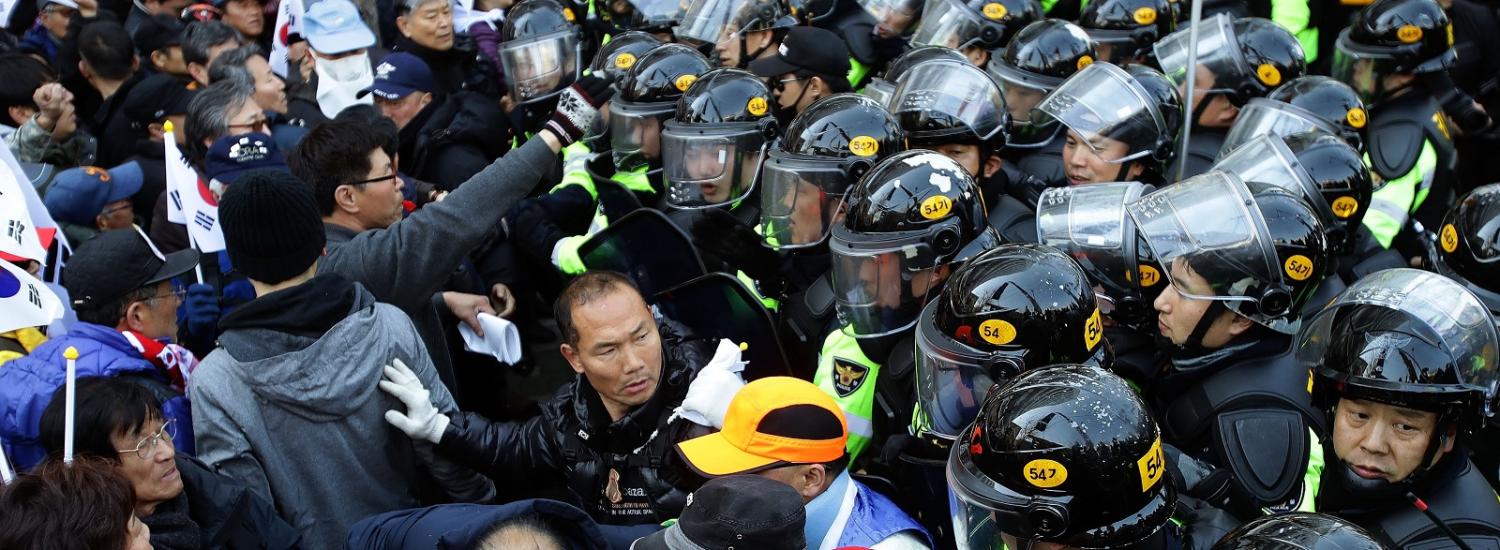The decision by South Korea’s Constitutional Court to uphold the National Assembly’s impeachment of beleaguered President Park Geun-hye is the starting gun in a 60-day race to the Blue House.
The Constitution requires that an election be held within that time period, which means a new leader will be elected by 9 May at the latest. According to most polls, the next leader of South Korea is expected to be Moon Jae-in, the leader of the Minjoo Party, who came a close second to Park in the 2012 presidential election. While much can happen in two months in Korean politics, if Moon does become the next President, it will likely complicate South Korean politics and security policy even further in what has already become an incredibly tense period.
In recent weeks tensions on the Korean peninsula have been ratcheted up to their highest level in some years, following a North Korean assassination in Malaysia and a series of missile tests into the Sea of Japan, that were supposedly in response to this year’s Foal Eagle US-ROK exercise. As if that were not enough, China-ROK relations have also plummeted over the decision of the Park government to deploy the American Terminal High Altitude Area Defence (THAAD) ballistic missile defence system in South Korea. As the system was deployed in Seongiu Seoul, Beijing vented its fury by cancelling tour groups to South Korea and by sanctioning certain South Korean businesses in China. Adding a new South Korean leader to the mix could go in a number of ways.
First of all, what is Moon’s policy platform? Many of his views that first emerged during the 2012 election have come into sharper focus in the past few months. Like many Korean politicians from the left, he has an antagonistic relationship with South Korea’s security agencies. Like his mentor, Roh Moo-hyun, president from 2003-2008, Moon has been arrested for his views. Consequently, he has pledged to reform government organisations, saying earlier this week: 'The authorities, such as Cheong Wa Dae, the prosecution, and the Intelligence Service, have been the main culprits undermining democracy'. Faced with a slowing economy and high unemployment – particularly among the young – Moon has promised 'a revolution to create more and better jobs'. With a slogan of 'people first', he has also stated that he intends to reform the chaebol system, in which large conglomerates dominate the Korean economy and are said to have contributed to a widening between haves and have-nots.
In terms of the relationship with the United States, Moon has a mixed record. On the one hand, has called the US the 'most important country' for Seoul, while at the same time stated that he’s against the deployment of the THAAD system inside the country. The system was hastily deployed earlier this month, perhaps in anticipation of Friday’s ruling. Moon asserted, 'Reconsidering THAAD would have to be proceeded with diplomatic efforts, including diplomatic efforts with the US. I don’t think…[it] would harm the South Korea-US alliance. Given the transactional nature of the Trump administration, removing a system which gives early warning of a North Korean missile launch to US forces in Japan or the continental United States, this assertion is dubious. The fact that Moon Jae-in is also known to favour an engagement-heavy approach toward North Korea may also push the relationship into crisis, since the Trump administration has signalled that it favours a hard line on the regime.
On the other hand, Moon’s approach will please Pyongyang and Beijing, which have have both resented the Park government’s close ties with Washington. Beijing will be particularly pleased if Moon withdraws the American radar system from the peninsula, since it worries about the system’s ability to gather data on its nuclear deterrent. Warning both about 'consequences', China has already begun sanctioning South Korean companies and blocking Chinese tour groups from visiting the country. With regards to Moon’s approach toward Pyongyang, Chad O’Carroll from NK News Watch states, 'Moon Jae-in’s election could result in the largest ever shift from one administration to another of North Korea policy in South Korea’s history. As this will likely cause issues between Seoul and its allies, O’Carroll asserts that 'the North will exploit any policy confusion as soon as it begins to arise'.
Former-President Park Geun-hye has spent her last night in the Blue House presidential palace. Her isolation now is in many ways a striking metaphor for South Korea’s own position. Historically, Koreans have referred to their state as a 'shrimp surrounded by whales'. The pressures, internal and external, on the Korean polity from Beijing and Washington, from Tokyo and Pyongyang, reveal a kernel of truth in this odd saying. Whoever becomes the next President of South Korea will have many issues to navigate, and many choices to make. Let’s hope they bring calm and some security.

